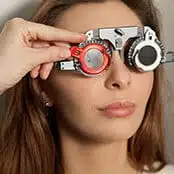Cataract Surgery &
Premium Upgrades
Cataracts are a major cause of vision loss worldwide; almost 20 million people are blind because of the condition. However, advanced cataract surgery can restore lost sight in most cases.
In the United States, more than 24 million people over the age of 40 are affected by cataracts. Cataract surgery is the most commonly performed procedure by ophthalmologists, with more than 3.6 million cataract surgeries performed annually.
At Advanced Sight Center in Washington, Missouri, Dr. Chris Ullrich specializes in cataract surgery. As a board-certified ophthalmologist with nearly three decades of experience, he has performed more than 20,000 successful cataract surgeries.
Learn more about cataracts and cataract surgery below.
A cataract is the clouding of a transparent part of your eye called the lens. A normally clear lens focuses light onto the retina, which is located in the back of the eye. When the lens becomes cloudy and opaque, light cannot pass through to the retina, resulting in blurry or cloudy vision.
The aging process is most directly associated with cataracts. As the body ages, the normally transparent lens begins to harden and becomes cloudy. There is increasing evidence that lifelong exposure to ultraviolet light contributes to the formation of cataracts.
Over half of all people aged 65 or older have some degree of cataract development. In addition, eye injuries, certain medications, diabetes, kidney disease, smoking, and high blood pressure may contribute to the formation of cataracts.
Innovative Lens Implants
Light Adjustable Lenses (LALs), multifocal lenses, and toric lenses are all advanced options for vision correction, but they serve different purposes and address specific visual conditions. If you are diagnosed with cataracts or are considering refractive lens exchange, Dr. Ullrich will recommend the best type of lens implants based on your individual vision needs. He will explain everything in simple terms and give you realistic expectations. Today’s premium IOLs can provide you with clear vision at all distances and reduce or even eliminate your need to wear glasses or contact lenses. To learn more about the innovative lens implants we offer in Washington, Missouri, call Advanced Sight Center today. Here's a comparison of these three types of lenses:
- Purpose: LALs are designed to provide customized vision correction and adaptability over time.
- Technology: LALs utilize a unique polymer material that can be reshaped with specific light patterns, allowing precise adjustments to the lenses.
- Flexibility: LALs can be modified without the need for new prescriptions, providing convenience and cost savings.
- Suitable for: LALs are suitable for individuals with a wide range of refractive errors, including nearsightedness, farsightedness, astigmatism, and presbyopia.
- Purpose: Multifocal lenses address the need for clear vision at different distances (near, intermediate, and far) within a single lens.
- Design: Multifocal lenses have distinct zones or segments with different prescription powers to accommodate varying distances.
- Convenience: Multifocal lenses eliminate the need for multiple pairs of glasses or constant switching between different pairs.
- Suitable for: Multifocal lenses are primarily used by individuals with presbyopia, which is the natural loss of near vision with age.
- Purpose: Toric lenses are specifically designed to correct astigmatism, which is characterized by an irregular cornea shape.
- Rotation and Alignment: Toric lenses have a unique shape and multiple prescription powers to align with the astigmatism meridians and provide clear vision.
- Options: Toric lenses are available in both soft disposable and rigid gas permeable varieties, offering choices for comfort and preference.
- Suitable for: Toric lenses are ideal for individuals with astigmatism, who require vision correction for both astigmatism and any additional refractive error like nearsightedness or farsightedness.
In summary, LALs offer customized vision correction and adaptability, multifocal lenses provide clear vision at various distances within a single lens, and toric lenses are specialized for correcting astigmatism. The choice of lens depends on the individual's specific visual needs and conditions, and consulting with an eye care professional is crucial to determine the most suitable option for optimal vision correction.
Cataract Surgery in Washington, MO
Don’t put your vision at risk. Early diagnosis and treatment is paramount to preserving your vision. If you are experiencing blurry vision, dimming, glare while driving at night, or double vision, call and schedule your appointment at Advanced Sight Center today, or request one online. Our ophthalmologist can see you in Washington, Missouri.




